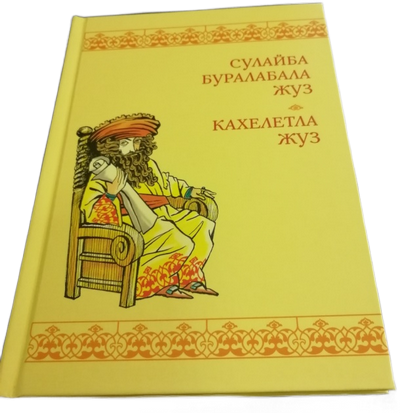
The Dargi Bible translation team is based in Dagestan. One of the team members, who translated Song of Songs and edited several other Dargi Scripture portions, recently dropped by the IBT office during a visit to Moscow. He eagerly shared many life stories with IBT staff, including the following episode: “I recently paid a visit to a Dargi artist in Makhachkala and caught him reading the Bible in Russian. ‘Wow, what’s this?’ I asked him. ‘Everyone here reads the Koran, and you’re reading the Bible! How come?’ ‘I don’t know Arabic,’ he answered plainly. ‘I’d rather learn what I need from the Bible.’”
“And did you tell him that you are involved in translating the Bible into Dargi?” I inquired. “No, I didn’t,” replied the translator. “He doesn’t read in Dargi anyway. Do you think that every Dargi can read the Dargi language? They can’t!” – replied my interlocutor.
His answer upset me, so I asked a clarifying question: “Then who are we translating for, if only a few people can read in Dargi?” “This too shall pass,” our guest unexpectedly replied in words traditionally attributed to King Solomon.
Being a Dargi poet, he knows his mother tongue exceedingly well and works for a Dargi literary magazine, but he didn’t look at all sad describing the sad situation with his native language. “What exactly shall pass?” I asked, puzzled.
“The time will pass when people forget their language and don’t learn it. The time will come when they start reading it again! People just haven’t yet realized what will become of them if they lose their native language. If they lose their mother tongue, they will lose a huge part of their culture. When they realize this, they will read again! And these Bible editions will definitely be in demand, because they are something new for people. All religions are connected, and their main message is similar. People are interested in this.”
I remembered some words spoken earlier by the Dargi exegetical advisor. Unlike my interlocutor, he can look at the situation in Dagestan as an outsider – first as a Christian and second as someone who doesn’t live there. Besides this, the exegete used to work in Bible translation projects in several other regions of Russia, so he has a basis for comparison. Here’s what he said: “Everyone working in the Dargi project, both during the translation process and during the field testing of the translated texts, has one thing in common: they all want to find something meaningful, something authentic. It’s clear to me that the Bible fulfills this need. But here comes the most difficult thing: how to convey it so people would realize that you aren’t proselytizing, but sincerely sharing a treasure with them? After all, Dagestan is a region with recently revived Muslim traditions that many people still don’t really understand, but these traditions are firmly associated in their minds with their ethnic identity.

Here’s an example: we published the Proverbs of Solomon and the book of Ecclesiastes as a single edition, and our new translator decided to give this book out at a Dargi language celebration. She says that people were eager to receive the book, happy to see something interesting in their mother tongue. They opened it, read several passages and admired it. But as soon as they learned that these were translations from the Bible, their reaction became paradoxical: ‘Why are these things specifically in the Bible? Who gave the Bible the right to appropriate all this for itself?!’”
With such examples in my mind, and also remembering how the Dargi translator asked the artist why he wasn’t reading the Koran, I decided to find out more about the use of the Koran among the Dargi people. I wished to acquire a full picture of what sort of audience our Bible translations reach, and if people know the stories common to the Bible and the Koran well enough. So I asked him if reading the Koran was part of the daily practice of life, and in what language people read it: in Dargi as their mother tongue, in Russian as the lingua franca, or in Arabic as the original language? It’s a well-known fact that zealous Muslims consider it inappropriate to translate the Koran at all, since translation may distort the meaning of the original.
“We do have a Dargi translation of the Koran,” the translator replied. “But people don’t believe what they read there. They say, ‘It’s impossible that such things would be written in the Koran!’ The Dargi edition is not a commented edition. I’ll add my own opinion that the Koran should be read only with the help of explanatory footnotes or a commentary. If you read only the text itself without annotation, you won’t understand anything, even if you read a scholarly Russian translation. The best-known academic translation of the Koran into Russian was made by Professor Nuri Osmanov, and he was a Dargi! But he insisted that his level of Dargi knowledge wasn’t high enough to allow him to help with translating the Koran into Dargi. He also said that he never met any of the Koran’s translators into Dargi. So Prof. Osmanov had nothing to do with the existing Dargi translation of the Koran. That translation was made without any system of multiple checks like the ones that IBT follows in the process of Bible translation. Maybe this is why the Dargi Koran translation is not considered authoritative.

The practice of learning the Koran by heart in Arabic is now widespread in our region. People who have completely memorized the Koran in Arabic are called hafiz. For example, the younger brother of my daughter’s husband became a hafiz. He studied for seven years with 30 others, and 16 of them learned the whole Koran by heart. And what a huge book – not every head can endure such a thing! It’s popular nowadays to hold contests among the hafiz to see who can recite it the best. Now, none of them have actually studied the Arabic language; they’ve learned how to pronounce the text correctly, but they don’t know what it says. According to my observations, people nowadays play believers. Everyone goes to the mosque, but what people talk about among themselves is far from religion. They can leave the mosque and go out for a drink. It turns out that religion is just another hobby. Some time ago Muslims in Moscow demanded that more mosques be built and that the call to prayer be sounded. But why do they need the call to prayer in Moscow? The Koran itself says: ‘The whole earth is a mosque.’ That’s how it should be. God is one. People of different customs and religions address the same God. And to be stubborn and stand on the fact that my religion is the best – what’s the use in this?”

This conversation took place shortly after the publication of the Four Gospels, Acts and Revelation in Dargi. Our Dagestani guest asked if he could get a copy of this edition, even though he was not the one who translated it. IBT staff of course agreed, explaining that Scripture translations are never attributed to this or that translator as a private piece of work. We offered him to take even ten copies of the book, if he wants. “OK, ten is fine,” answered our guest … but he did not look truly satisfied. We asked him if he would be able to distribute more than ten copies. “Well, of course I can! Easily 40 or 50. I’ll give them to everyone around me, there are lots of interested people,” was his surprising answer. We decided to ask him if he would take a hundred copies, and here our guest really cheered up and shared the following, “I give Dargi Scripture translations to friends and friends of friends, and often hear: ‘Are there more books? Please give me more!’ And one person, after reading the book, said: ‘Why haven't I seen this before?’”
This is the complicated environment that Scripture translations enter in the complex region of Dagestan. People like what they read in the Bible … but they struggle against finding it in the Bible. They want to know the Koran, but when they read it, they do not believe what is written and prefer to read without understanding. They play at religion, but seek for truth in earnest. “Everyone wants to hear the truth!” exclaimed the Dargi exegete. This is the redeeming fact that gives hope both to a language and to a Bible translation project.
We would greatly appreciate your financial assistance towards IBT projects. You can find IBT's bank info in Russia below. If you prefer to send your donation through a forwarding agent in the U.S. or Europe, please write to us and we'll provide the details of how this can be done.
IBT Russia/CIS is a non-profit organization financed through contributions from individuals, sponsoring organizations and foundations.
You can donate to IBT:
Through: AO UniCredit Bank, Moscow
SWIFT: IMBKRUMM
In favour of: Institute for Bible Translation
Address: 119334, Russia, Moscow, Andreevskaya nab. 2
TIN (INN) 7736231521
9-digit Bank identification code in Russian banking system: 044525545
Account no. (IBAN):
634261 USD 4020 02 001 or 40703840700010142881
634261 EUR 4020 02 001 or 40703978700010366720
634261 GBP 4020 02 001 or 40703826600010366723
Through: NOSTRO ACCOUNTS OF AO UNICREDIT BANK, MOSCOW:
USD JPMORGAN CHASE BANK N.A., NEW YORK SWIFT CODE: CHASUS33
EUR UNICREDIT BANK AG (HYPOVEREINSBANK) , MUNICH SWIFT CODE: HYVEDEMM
EUR UNICREDIT BANK AUSTRIA AG, VIENNA SWIFT CODE: BKAUATWW
EUR UNICREDIT S.P.A., MILANO SWIFT CODE: UNCRITMM
GBP THE ROYAL BANK OF SCOTLAND PLC, LONDON SWIFT CODE: RBOSGB2L
Important! In the field "designation" write "CHARITY DONATION"
For more information address IBT
You may sign up to receive our Russia/CIS monthly English newsletter here
